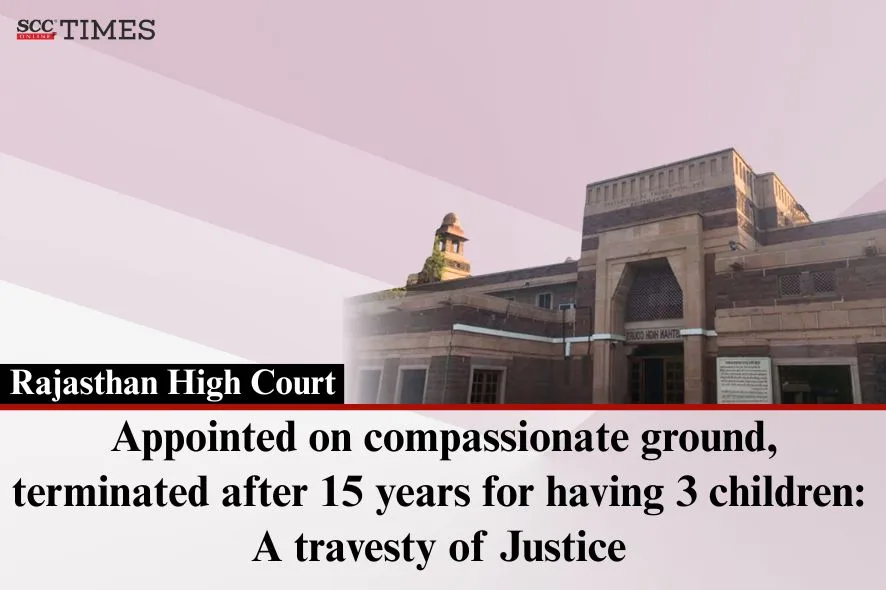Rajasthan High Court: In a Civil Writ Petition, filed by the son of a martyr appointed on compassionate basis, challenging the termination order on ground of ineligibility for having 3 children at the time of appointment, a single-judge bench of Vinit Kumar Mathur, J., quashed and set aside the termination order, holding that if a person has served the department for fifteen long years, it would be a travesty of justice to terminate his services by treating him ineligible for appointment, particularly when he did not secure employment by unfair means. The Court emphasised that compassionate appointment policies, designed for humanitarian ends, should not be enforced with undue rigidity to cause injustice.
BACKGROUND
The petitioner’s father, serving as a Hawaldar in the Indian Armed Forces, attained martyrdom during Operation Pawan. Pursuant to a notification by the respondent inviting applications for compassionate appointments to the families of martyrs, the petitioner applied for such an appointment. After due verification of his qualifications and family details, the petitioner was appointed on compassionate grounds to the post of Lower Division Clerk (‘LDC’) and joined on 25-02-2010. He was confirmed on the said post on 02-03-2012, after satisfactorily completing two years of service. The petitioner duly submitted all family details, including information about his wife and three children, for his service records and State Insurance purposes. In 2019, a complaint was made to the respondent department alleging that the petitioner had three children at the time of appointment. Despite petitioner’s explanation reiterating that his marital status and children’s details were disclosed in 2012, his services were terminated vide order dated 26-12-2024. Aggrieved by this, the petitioner filed the present petition.
ISSUE
Whether the action of the respondents for terminating the petitioner’s services, after more than a decade of continuous service, based on a delayed complaint alleging eligibility issues, can be sustained in law or not?
COURT’S OBSERVATION
The Court reiterated that compassionate appointment, while not a vested right, is a policy-driven exception aimed at providing immediate relief and socio-economic support to families of deceased government employees. The purpose is not to offer long-term employment, but to prevent the family from slipping into financial hardship. This welfare-driven intention must guide the interpretation and implementation of such schemes.
The Court referring to referred to Umesh Kumar Nagpal v. State of Haryana, (1994) 4 SCC 138, noted that one of the exceptions to the appointments in public service made strictly based on open invitation of application and merit is compassionate appointment. In certain cases, unless some source of livelihood is provided, the family would not be able to make both ends meet, a provision is made in the rules to provide gainful employment to one of the dependents of the deceased who may be eligible for such employment. The object of compassionate appointment is to enable the family to tide over the immediate crisis, and such matters must be dealt with sensitivity and compassion.
The Court noted that in Md. Zamil Ahmed v. State of Bihar, (2016) 12 SCC 342, the Supreme Court held that the State should not terminate services after a lapse of 15 years on grounds of policy violation, especially when the employee was not responsible for any false declaration or suppression of material facts. The Court observed that in the present case, there was nothing on record to suggest that the petitioner suppressed any material fact or procured employment by fraud. The details regarding his children were submitted in 2012 and duly accepted by the department. The complaint surfaced nearly ten years after his appointment and service confirmation.
The Court emphasized that compassionate appointment policies should not be enforced with undue rigidity. Since the petitioner had not suppressed any material facts and the respondent authority, after thorough scrutiny, found him fit for appointment, it would be manifestly unjust and excessively harsh to terminate his services after an uninterrupted period of 15 years.
Such action would defeat the object of compassionate appointment and cause irreparable harm to the petitioner. The principles of natural justice, legitimate expectation, and equity weighed heavily in favor of the petitioner, especially as no fraud or misrepresentation was attributed to him. The Court further stated that the disqualification on the ground of having three children could not override the humanitarian objective of the compassionate appointment scheme, particularly in cases involving martyrdom where a humane and flexible approach is constitutionally expected by the State.
The Court noted that,
“The insistence on technical compliance, especially when there is no allegation of malafide or concealment, defeats the very objective of such schemes. The rules framed to serve humanitarian ends should not be used as instruments of injustice. Even assuming there was a technical breach, the same ought to have been viewed in the light of the petitioner’s unique circumstances and long, blemish-free service.”
The Court also noted that the Enquiry Officer’s report confirmed that the petitioner had not suppressed any information.
In light of the afore-stated reasons, the Court quashed the termination order.
[Sagar Kumar v. State of Rajasthan, 2025 SCC OnLine Raj 3333, decided on 08-07-2025]
Advocates who appeared in this case:
For the Petitioner: Kailash Jangid, Mohan Singh Shekhawat, Kunal Singh Rathore, Abhinav Pareek, Advocates
For the Respondent: Meenal Singhvi for Rajesh Panwar, Sr. Adv. & AAG


